倒装句讲解及练习和答案
倒装句专项练习题及答案详解
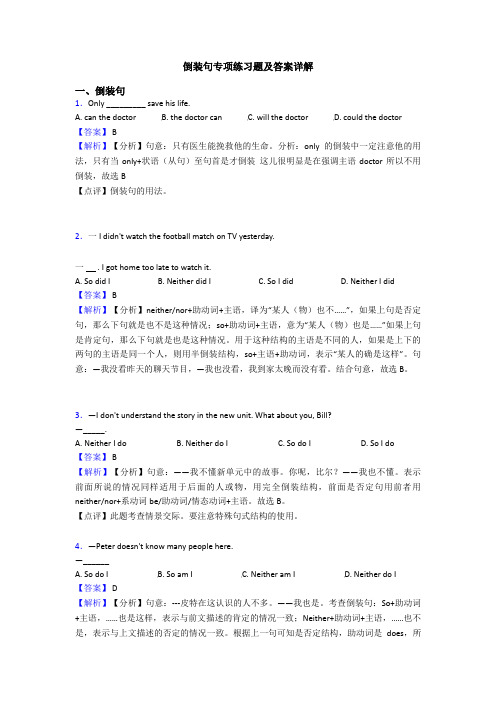
倒装句专项练习题及答案详解一、倒装句1.Only _________ save his life.A. can the doctorB. the doctor canC. will the doctorD. could the doctor【答案】 B【解析】【分析】句意:只有医生能挽救他的生命。
分析:only的倒装中一定注意他的用法,只有当only+状语(从句)至句首是才倒装这儿很明显是在强调主语doctor所以不用倒装,故选B【点评】倒装句的用法。
2.一 I didn't watch the football match on TV yesterday.一 . I got home too late to watch it.A. So did IB. Neither did IC. So I didD. Neither I did【答案】 B【解析】【分析】neither/nor+助动词+主语,译为“某人(物)也不……”,如果上句是否定句,那么下句就是也不是这种情况;so+助动词+主语,意为“某人(物)也是……”如果上句是肯定句,那么下句就是也是这种情况。
用于这种结构的主语是不同的人,如果是上下的两句的主语是同一个人,则用半倒装结构,so+主语+助动词,表示“某人的确是这样”。
句意:—我没看昨天的聊天节目,—我也没看,我到家太晚而没有看。
结合句意,故选B。
3.—I don't understand the story in the new unit. What about you, Bill?—_____.A. Neither I doB. Neither do IC. So do ID. So I do【答案】 B【解析】【分析】句意:——我不懂新单元中的故事。
你呢,比尔?——我也不懂。
表示前面所说的情况同样适用于后面的人或物,用完全倒装结构,前面是否定句用前者用neither/nor+系动词be/助动词/情态动词+主语。
倒 装 句(含讲解和题目)
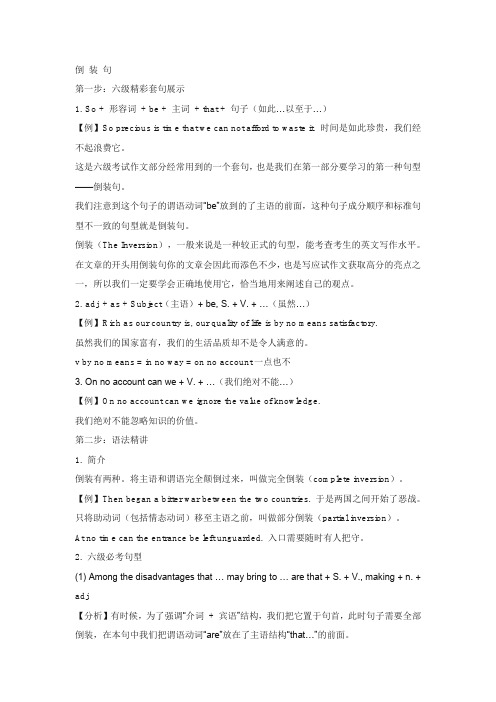
倒装句第一步:六级精彩套句展示1. So + 形容词+ be + 主词+ that + 句子(如此…以至于…)【例】So precious is time that we can not afford to waste it. 时间是如此珍贵,我们经不起浪费它。
这是六级考试作文部分经常用到的一个套句,也是我们在第一部分要学习的第一种句型——倒装句。
我们注意到这个句子的谓语动词“be”放到的了主语的前面,这种句子成分顺序和标准句型不一致的句型就是倒装句。
倒装(The Inversion),一般来说是一种较正式的句型,能考查考生的英文写作水平。
在文章的开头用倒装句你的文章会因此而添色不少,也是写应试作文获取高分的亮点之一,所以我们一定要学会正确地使用它,恰当地用来阐述自己的观点。
2. adj. + as + Subject(主语)+ be, S. + V. + …(虽然…)【例】Rich as our country is, our quality of life is by no means satisfactory.虽然我们的国家富有,我们的生活品质却不是令人满意的。
v by no means = in no way = on no account一点也不3. On no account can we + V. + …(我们绝对不能…)【例】On no account can we ignore the value of knowledge.我们绝对不能忽略知识的价值。
第二步:语法精讲1. 简介倒装有两种。
将主语和谓语完全颠倒过来,叫做完全倒装(complete inversion)。
【例】Then began a bitter war between the two countries. 于是两国之间开始了恶战。
只将助动词(包括情态动词)移至主语之前,叫做部分倒装(partial inversion)。
英语倒装句常见题型及答题技巧及练习题(含答案)含解析
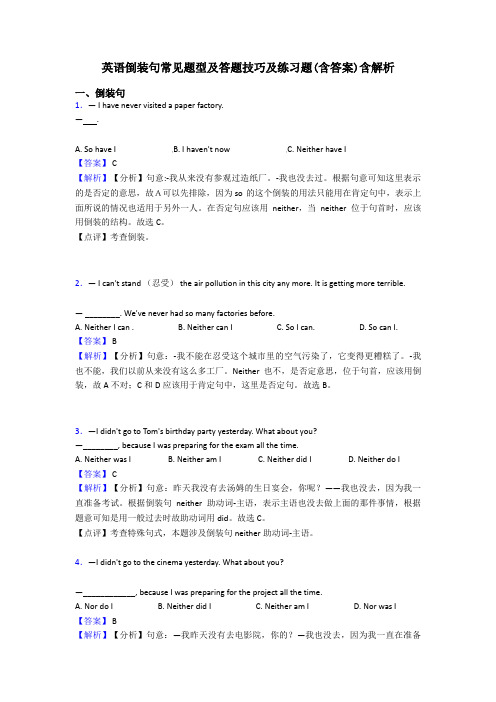
英语倒装句常见题型及答题技巧及练习题(含答案)含解析一、倒装句1.— I have never visited a paper factory.— .A. So have IB. I haven't nowC. Neither have I【答案】 C【解析】【分析】句意:-我从来没有参观过造纸厂。
-我也没去过。
根据句意可知这里表示的是否定的意思,故A可以先排除,因为so 的这个倒装的用法只能用在肯定句中,表示上面所说的情况也适用于另外一人。
在否定句应该用neither,当neither 位于句首时,应该用倒装的结构。
故选C。
【点评】考查倒装。
2.— I can't stand (忍受) the air pollution in this city any more. It is getting more terrible.— ________. We've never had so many factories before.A. Neither I can .B. Neither can IC. So I can.D. So can I.【答案】 B【解析】【分析】句意:-我不能在忍受这个城市里的空气污染了,它变得更糟糕了。
-我也不能,我们以前从来没有这么多工厂。
Neither也不,是否定意思,位于句首,应该用倒装,故A不对;C和D应该用于肯定句中,这里是否定句。
故选B。
3.—I didn't go to Tom's birthday party yesterday. What about you?—________, because I was preparing for the exam all the time.A. Neither was IB. Neither am IC. Neither did ID. Neither do I【答案】 C【解析】【分析】句意:昨天我没有去汤姆的生日宴会,你呢?——我也没去,因为我一直准备考试。
高中英语 高三复习倒装句资料 含讲义和练习、答案

倒装句:“NAOSHI” 原则一、什么是倒装:有时由于句子结构的需要或表示强调或方便上下文衔接,要采用倒装形式。
主+ 谓------------- 自然语序谓+ 主------------- 完全倒装助动词/系动词/情态动词+ 主+ 谓------------- 部分倒装(半倒装)强调部分+ as + 主+ 谓------------- 形式倒装举例:1. The bus is coming here!倒装:Here comes the bus! (名词作主语)2. Our school lies north of the river.倒装:North of the river lies our school.二、“闹事N A O S H I”原则详解:N: 助动词/系动词/情态动词+ 主语+ 谓语(半倒装)1. 否定副词置于句首,句子部分倒装,( 如never, nor, not, hardly, hardly...when, no sooner...than, little, seldom, scarcely, rarely等)Hardly do I think you will make it.Not until midnight did it stop raining.Not only should we not be afraid of difficulties, but we should try our best to overcome them.2. 表示否定意义的短语置于句首,部分倒装,( 如at no time, under/in no circumstances, in no case, by no means,on no condition 等)By no means should you tell him about it. 你绝不要告诉他这事。
A : 形式倒装(前置)As/though引导的让步状语从句:只把强调的内容提到句首,主谓不用变化。
高中英语倒装句讲解以及习题(附答案)
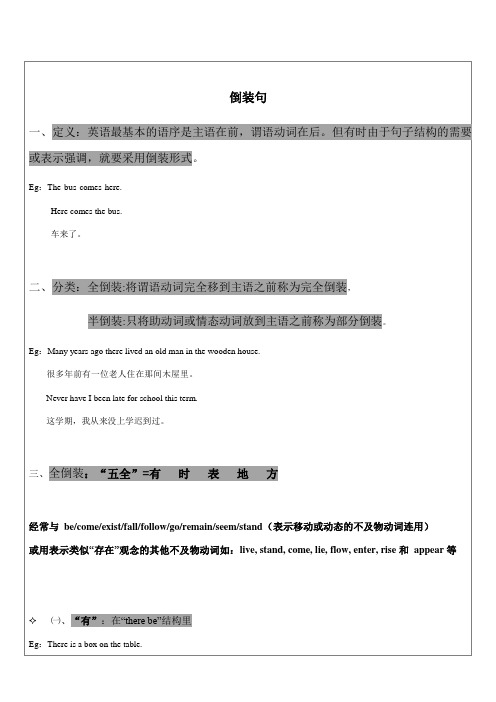
桌子上面有一个盒子。
✧㈡、“时”:表示时间副词,如:now,then,
Eg:Now comes your turn.
现在轮到你了。
✧㈢、“表”:表语放句子前,“表语+系动词+主语” 的结构
Eg:Present at the party were Mr. Green and many other guests.
格林先生和其他的客人在这个聚会上。
Seated on the ground are a group of young men.
一群年轻人坐在了地上。
✧㈣、“地”:地点状语放在句首
Eg:In south of the river lies a small factory.
小工厂位于河的南方。
From the valley came a cry.
山谷传来一阵哭声。
✧㈤、“方”:表方位的副词here, there 或out, in, up, down, away, off 等标志词放在句首 Eg:There lies a large wheat field in front of the house.
房子前面有一大片麦田。
Off all the lights went when I came in.
当我进来时,所有的灯都灭了。
四、半倒装:“八部”=不只让步也常需(虚)如此祝福✧㈠、“不”表示否定。
(完整版)倒装句精讲及练习(含答案)

倒装句的用法英语倒装句分为两种:1、整个谓语在前的句子,叫完全倒装。
Here comes the car.2、部分谓语(情态动词、助动词、连系动词)在前,谓语的主体部分仍在主语之后的句子,叫部分倒装句。
Only then did he realize that he was wrong.必须弄清的两点:①若有主从句,哪句倒装。
②部分倒装还是完全倒装。
一、表示方位和时间的副词位于句首时(now ,then here ,there,out ,in ,up,down ,away ,back,off,on ), 句子全部倒装。
注:主语是代词时,不倒装。
(如 5,6)1.Here comes the bus .2.There goes the bell .3.Away went the students .4.Now comes the chance .Out rushed the children. he rushed.There comes the bus. 注意: 1.不能用进行时;he comes.2. 主语为人称代词时不倒装。
二、以介词短语表示的状语,提前位于句首时,全部倒装。
1.In a lecture hall of a university in England sits a professor .2.In front of our school stands a tower .3.By either side of the river grow a lot of apple trees .4.At the top of the mountain stands a temple .5. Among the goods are Christmas trees,flowers and toys.三、表语位于句首时,倒装结构为“表语+连系动词 +主语”A:形容词 +连系动词 +主语例 1.Present at the meeting were Professor White,Professor Smith and many other guests. 例 2.过去分词 +连系动词 +主语Gone are the days when they could do what they liked to the Chinese people.四、将 so\neither \nor 放在开头 ,表示“ 也 (不 )”的意思时 ,部分倒装注: 表示“确实是这样”时 ,不倒装1.He went to the film last night.So did I .2.You must finish your work ,so must I .3.She is interested in the story ,so am I .4.He didn ’ t turn up .Neither did his brother .5.His mother told him not to go to the film .So he did.五、在 if 条件 :在 if 条件句中 ,通常可以省略条件句 ,必须含有系动词if , 而将从句倒装were,助动词had 和情态动词should1.Were he younger(=If he were younger ),he would learn skating .2.Should they forget (=If they should forget ) to bring a map with them ,they would get lost inthe woods .3.Had they realized (=If they had realized ) how important the task was ,they wouldn ’ t have refused to accept .4.Were I you ,I would help her .六、否定词或半否定词(never .little ,seldom ,not ,nowhere ,scarely ,few ,by no means ,at no time ) 位于句首 ,应部分倒装1.Never have I been there .2.Little did I know about it .3.Seldom did she come late to school .4.Not a single mistake did he make .5.By no means should you buy that kind of car .七、以 not until,no sooner than , hardly when ,not only but also 所引导的状语放在句首时 ,需要部分倒装1.Not until 10 ’clock will the library open .2.No sooner had I gone out than he came to see me .3.Hardly had the train arrived when I ran to meet my friend.4.Not only does she speak English but also she follows the British way of life .八、 only及其修饰的状语位于句首时,后面的句子部分倒装。
倒装句练习题含答案及解析
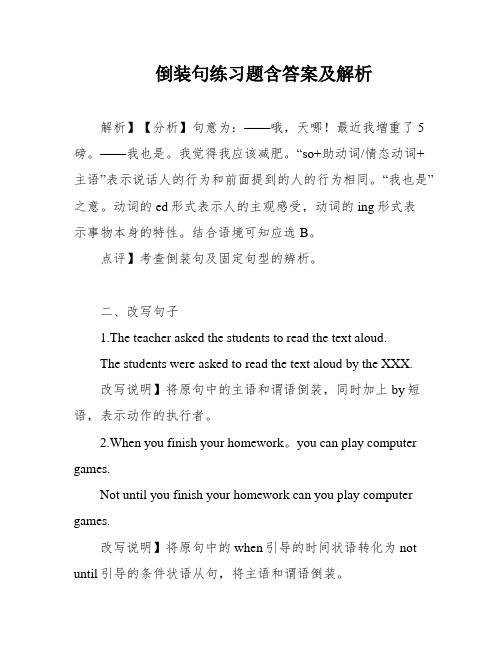
倒装句练习题含答案及解析解析】【分析】句意为:——哦,天哪!最近我增重了5磅。
——我也是。
我觉得我应该减肥。
“so+助动词/情态动词+主语”表示说话人的行为和前面提到的人的行为相同。
“我也是”之意。
动词的ed形式表示人的主观感受,动词的ing形式表示事物本身的特性。
结合语境可知应选B。
点评】考查倒装句及固定句型的辨析。
二、改写句子1.The teacher asked the students to read the text aloud.The students were asked to read the text aloud by the XXX.改写说明】将原句中的主语和谓语倒装,同时加上by短语,表示动作的执行者。
2.When you finish your homework。
you can play computer games.Not until you finish your homework can you play computer games.改写说明】将原句中的when引导的时间状语转化为not until引导的条件状语从句,将主语和谓语倒装。
3.The little boy ran out of the room as soon as he saw the spider.As soon as the spider was seen by the little boy。
he ran out of the room.改写说明】将原句中的主语和谓语倒装,同时将时间状语as soon as转化为被动语态中的as soon as被动语态结构,表示动作的承受者。
4.She never goes to bed until she finishes her work.Not until she finishes her work does she go to bed.改写说明】将原句中的never转化为not until,将主语和谓语倒装,表示动作的执行者。
【英语】初中英语倒装句解题技巧讲解及练习题(含答案)

【英语】初中英语倒装句解题技巧讲解及练习题(含答案)一、倒装句1.— I have never visited a paper factory.— .A. So have IB. I haven't nowC. Neither have I【答案】 C【解析】【分析】句意:-我从来没有参观过造纸厂。
-我也没去过。
根据句意可知这里表示的是否定的意思,故A可以先排除,因为so 的这个倒装的用法只能用在肯定句中,表示上面所说的情况也适用于另外一人。
在否定句应该用neither,当neither 位于句首时,应该用倒装的结构。
故选C。
【点评】考查倒装。
2.—I couldn't work out the math problem.—________. I found ________ difficult for us to do it.A. So could I; thisB. Neither could I; itC. So can I; thatD. Neither I could; it【答案】 B【解析】【分析】句意:——我算不出这道数学题。
——我也不能。
我发现解决这个问题对于我们来说很难。
第一空考查倒装结构,我发现让我们做它很难。
上句发生一件事,下句有同样事情发生时,后面的句子用倒装结构,前面的句子是否定句,后面的倒装句用Neither引导,Neither+助动词+主语。
第二空考查it作形式宾语,主语+谓语+it+形容词+for sb. to do sth.it是形式宾语,动词不定式是真正的宾语,故选B。
【点评】此题考查倒装结构和it用法。
注意neither引导的倒装句用法和固定句式结构:主语+谓语+it+形容词+for sb. to do sth.3.— I think the plan is just a waste of time. What do you think?— Well, if you don't support the plan, ________.A. neither do IB. so do IC. neither will ID. so will I【答案】 C【解析】【分析】句意:——我认为这个计划只是在浪费时间。
(完整版)倒装句全面讲解和练习(答案)

(完整版)倒装句全面讲解和练习(答案)初中英语倒装句(一)倒装句的意义1、适应一定的语法结构的需要,主要是指疑问句句型结构的需要。
E.g. Was the People’s Liberation Army founded in 1927?2、为了强调某一部分,而把这部分放到句首,构成倒装。
e.g. Never have I been late for school this term.(二)倒装的使用情况一、部分倒装:就是把谓语中的be动词、助动词或情态动词置于主语前面。
常见于下列几种情况:(一). only所修饰的副词,介词短语或状语从句放在句首时,要用:only+ 状语+ be /助动词/情态动词+主语及其他例如:Only when he told me the news did I know what had happened.注意:only修饰主语时,不需要倒装。
例如:Among all the people, only you know the truth.小试牛刀:Only in this way ________to make improvement in the operating system.A. you can hopeB. you did hopeC. can you hopeD. did you hope(二).含有否定意义的副词或连词放在句首时。
如:never, little, seldom, not, not only, not until, no sooner (…than), hardly (…when), rarely, scarcely, in no way等。
例如:We seldom get up at four in the morning.= Seldom do we get up at four in the morning.Not a single word from him could express his feelings.(1) hardly…when; scarcely…when…; no sooner…than… 可以用正常语序had hardly done when… did 或用倒装句式Hardly had +主语+ done when… did 句式。
(英语)英语倒装句解题技巧讲解及练习题(含答案)
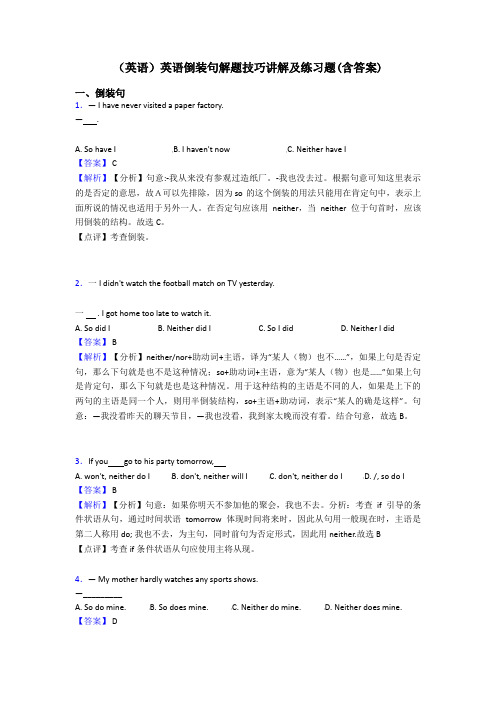
(英语)英语倒装句解题技巧讲解及练习题(含答案)一、倒装句1.— I have never visited a paper factory.— .A. So have IB. I haven't nowC. Neither have I【答案】 C【解析】【分析】句意:-我从来没有参观过造纸厂。
-我也没去过。
根据句意可知这里表示的是否定的意思,故A可以先排除,因为so 的这个倒装的用法只能用在肯定句中,表示上面所说的情况也适用于另外一人。
在否定句应该用neither,当neither 位于句首时,应该用倒装的结构。
故选C。
【点评】考查倒装。
2.一 I didn't watch the football match on TV yesterday.一 . I got home too late to watch it.A. So did IB. Neither did IC. So I didD. Neither I did【答案】 B【解析】【分析】neither/nor+助动词+主语,译为“某人(物)也不……”,如果上句是否定句,那么下句就是也不是这种情况;so+助动词+主语,意为“某人(物)也是……”如果上句是肯定句,那么下句就是也是这种情况。
用于这种结构的主语是不同的人,如果是上下的两句的主语是同一个人,则用半倒装结构,so+主语+助动词,表示“某人的确是这样”。
句意:—我没看昨天的聊天节目,—我也没看,我到家太晚而没有看。
结合句意,故选B。
3.If you go to his party tomorrow,A. won't, neither do IB. don't, neither will IC. don't, neither do ID. /, so do I 【答案】 B【解析】【分析】句意:如果你明天不参加他的聚会,我也不去。
分析:考查if引导的条件状语从句,通过时间状语tomorrow体现时间将来时,因此从句用一般现在时,主语是第二人称用do; 我也不去,为主句,同时前句为否定形式,因此用neither.故选 B【点评】考查if条件状语从句应使用主将从现。
英语语法专题倒装讲义和练习及答案

英语语法专题倒装讲义和练习及答案英语的大体语序是“主语+谓语”,若是将谓语的一部份或全数放在主语之前,这种语序叫倒装。
倒装既是一种语法手腕,也是一种修辞手腕,用于表示必然的句子结构或强调某一句子成份。
倒转句的考查主要从以下几个方面入手:1)含有否定意味的词置于句首,部份倒装;2)only+状语/状语从句置于句首,部份倒装;3)so/such…that句型中,so+形容词/副词提前,部份倒装;4)表示方位的副词或介词短语放在句首,要完全倒装。
一.倒装的原因A.语法倒装由于语法结构的需要,将谓语的全数或一部份移到主语之前。
1.一般疑问句当咱们把一个肯定句转变成疑问句时,常把肯定句中的助动词或情态动词放在句首。
这种助动词或情态动词包括:be,have,can,do,shall,will,may,must,dare,need,ought或used 等。
He will do it. ——Will he do it?他会做这件事吗?This is my mobile phone number. ——Is this your mobile phone number?这是你的电话号码吗?提示:若是肯定句中没有助动词或情态动词时,咱们可以在句首用do 的某种形式,以组成倒装语序。
Jack likes to eat fish. 杰克喜欢吃鱼。
——Does Jack like to eat fish 杰克喜欢吃鱼吗?2.特殊疑问句特殊疑问句的组成:特殊疑问词+ 一般疑问句What does he like to eat 他喜欢吃什么?When will they go to the Great Wall 他们何时去长城?Where did you go last night 昨晚你去哪里了?Who is not coming to dinner tonight 今晚谁不来用饭?3. 反意问句在反意问句中,用一般疑问句的形式,前后两分句的主语,人称要一致。
高中英语倒装句详解及练习(附答案)
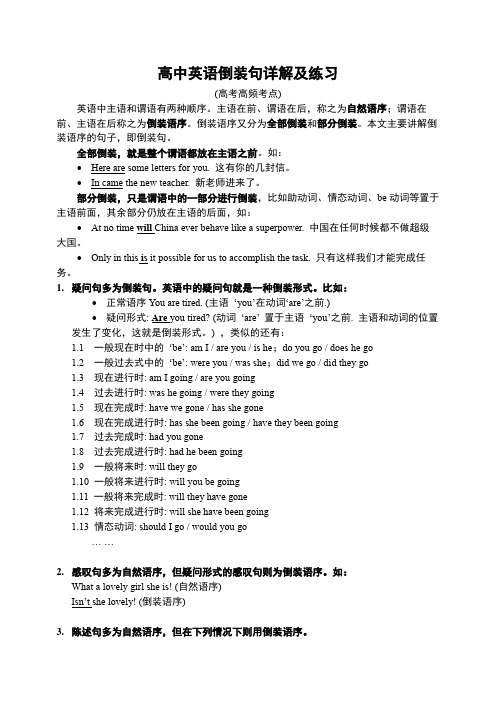
高中英语倒装句详解及练习(高考高频考点)英语中主语和谓语有两种顺序。
主语在前、谓语在后,称之为自然语序;谓语在前、主语在后称之为倒装语序。
倒装语序又分为全部倒装和部分倒装。
本文主要讲解倒装语序的句子,即倒装句。
全部倒装,就是整个谓语都放在主语之前。
如:•Here are some letters for you. 这有你的几封信。
•In came the new teacher. 新老师进来了。
部分倒装,只是谓语中的一部分进行倒装,比如助动词、情态动词、be动词等置于主语前面,其余部分仍放在主语的后面,如:•At no time will China ever behave like a superpower. 中国在任何时候都不做超级大国。
•Only in this is it possible for us to accomplish the task. 只有这样我们才能完成任务。
1.疑问句多为倒装句。
英语中的疑问句就是一种倒装形式。
比如:•正常语序You are tired. (主语‘you’在动词‘are’之前.)•疑问形式: Are you tired? (动词‘are’ 置于主语‘you’之前. 主语和动词的位置发生了变化,这就是倒装形式。
) ,类似的还有:1.1 一般现在时中的‘be’: am I / are you / is he;do you go / does he go1.2 一般过去式中的‘be’: were you / was she;did we go / did they go1.3 现在进行时: am I going / are you going1.4 过去进行时: was he going / were they going1.5 现在完成时: have we gone / has she gone1.6 现在完成进行时: has she been going / have they been going1.7 过去完成时: had you gone1.8 过去完成进行时: had he been going1.9 一般将来时: will they go1.10 一般将来进行时: will you be going1.11 一般将来完成时: will they have gone1.12 将来完成进行时: will she have been going1.13 情态动词: should I go / would you go… …2.感叹句多为自然语序,但疑问形式的感叹句则为倒装语序。
倒装句讲解及巩固提升练习(有答案)
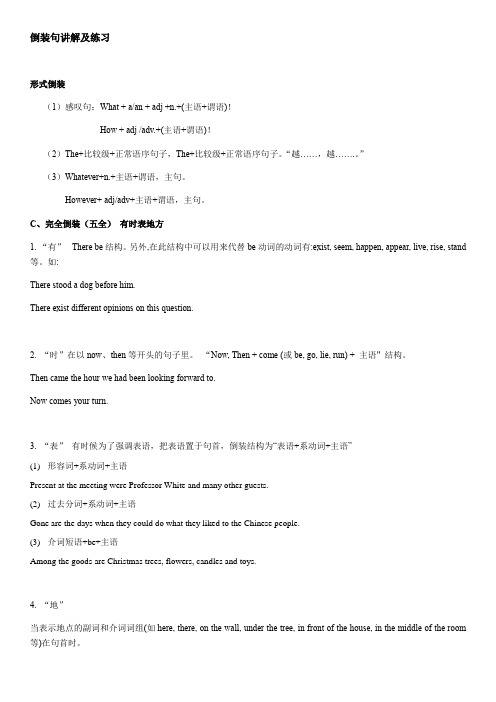
倒装句讲解及练习形式倒装(1)感叹句:What + a/an + adj +n.+(主语+谓语)!How + adj /adv.+(主语+谓语)!(2)The+比较级+正常语序句子,The+比较级+正常语序句子。
“越……,越…….。
”(3)Whatever+n.+主语+谓语,主句。
However+ adj/adv+主语+谓语,主句。
C、完全倒装(五全)有时表地方1. “有”There be结构。
另外,在此结构中可以用来代替be动词的动词有:exist, seem, happen, appear, live, rise, stand 等。
如:There stood a dog before him.There exist different opinions on this question.2. “时”在以now、then等开头的句子里。
“Now, Then + come (或be, go, lie, run) + 主语" 结构。
Then came the hour we had been looking forward to.Now comes your turn.3. “表”有时候为了强调表语,把表语置于句首,倒装结构为“表语+系动词+主语”(1)形容词+系动词+主语Present at the meeting were Professor White and many other guests.(2)过去分词+系动词+主语Gone are the days when they could do what they liked to the Chinese people.(3)介词短语+be+主语Among the goods are Christmas trees, flowers, candles and toys.4. “地”当表示地点的副词和介词词组(如here, there, on the wall, under the tree, in front of the house, in the middle of the room 等)在句首时。
(英语)英语倒装句练习题20篇及解析

(英语)英语倒装句练习题20篇及解析一、倒装句1.–David has made great progress recently. – ______, and ______.A. So he has; so you haveB. So has he; so you haveC. So he has; so have youD. So has he; so have you【答案】 C【解析】【分析】句意为:---戴维最近取得了很大进步。
---确实如此。
你也一样。
“so+be 动词(助动词、情态动词)+主语” 表示前面所叙述的事实也适合于另一个人,“也”之意。
“so+主语+be动词(助动词、情态动词)”表示肯定前面所叙述的是事实,“确实如此”之意。
结合语境可知应选C。
【点评】考查固定句型的用法。
2.—I don't understand the story in the new unit. What about you, Bill?—_____.A. Neither I doB. Neither do IC. So do ID. So I do【答案】 B【解析】【分析】句意:——我不懂新单元中的故事。
你呢,比尔?——我也不懂。
表示前面所说的情况同样适用于后面的人或物,用完全倒装结构,前面是否定句用前者用neither/nor+系动词be/助动词/情态动词+主语。
故选B。
【点评】此题考查情景交际。
要注意特殊句式结构的使用。
3.— Peter doesn't know many people here.— __________.A. So do IB. So am IC. Neither am ID. Neither do I【答案】 D【解析】【分析】句意:—皮特不认识这里的很多人。
—我也不认识。
题干是否定句,故用“neither+助动词+主语”表示和上句一样也不……;根据doesn't know 可知,用助动词do , 故选D。
英语倒装句答题技巧及练习题含答案

最新英语倒装句答题技巧及练习题(含答案)一、倒装句Only _________ save his life..1D. could the doctorC. will the doctor A. can the doctor B. the doctor canB 【答案】【解析】【分析】句意:只有医生能挽救他的生命。
分析:only的倒装中一定注意他的用法,只有当only+状语(从句)至句首是才倒装这儿很明显是在强调主语doctor所以不用B倒装,故选【点评】倒装句的用法。
He's never been late for school..2—________________.— D. Nor am IB. So am IC. Neither have I A. So have IC 【答案】【解析】【分析】句意:—他从来没有上学迟到过。
—我也没有。
So+助动词+主语,表示主语也是;neither+助动词+主语,表示主语也不是这样;根据上文是现在完成时,这里用。
C助动词have。
根据题意,故选主。
+【点评】考查固定句型neither+谓I don't understand the story in the new unit. What about you, Bill?—3._____.— A. Neither I do B. Neither do I C. So do I D. So I doB 【答案】【解析】【分析】句意:——我不懂新单元中的故事。
你呢,比尔?——我也不懂。
表示前面所说的情况同样适用于后面的人或物,用完全倒装结构,前面是否定句用前者用。
主语。
故选B/情态动词+助动词neither/nor+系动词be/【点评】此题考查情景交际。
要注意特殊句式结构的使用。
If Jack does, ____________. —.—Can you come to my birthday party, Lily?4C. so will IB. so I do A. so do IC 【答案】【解析】【分析】句意:-Lily,你能来参加我的生日晚会吗?-如果Jack去,我就会去。
倒装句知识点归纳及练习(附答案)
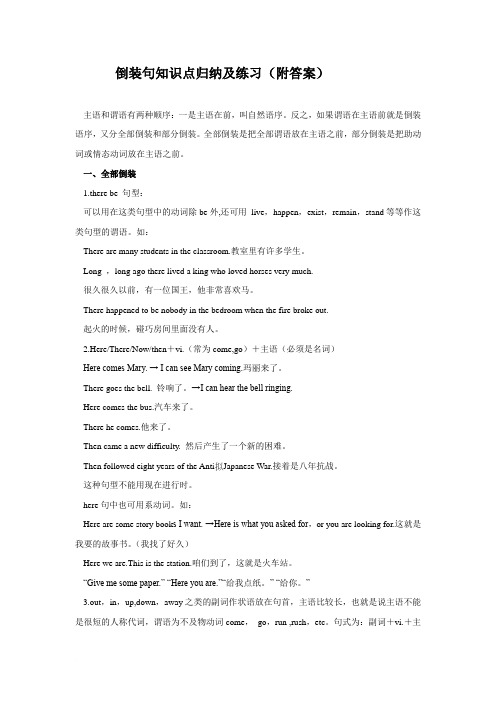
倒装句知识点归纳及练习(附答案)主语和谓语有两种顺序:一是主语在前,叫自然语序。
反之,如果谓语在主语前就是倒装语序,又分全部倒装和部分倒装。
全部倒装是把全部谓语放在主语之前,部分倒装是把助动词或情态动词放在主语之前。
一、全部倒装1.there be 句型:可以用在这类句型中的动词除be外,还可用live,happen,exist,remain,stand等等作这类句型的谓语。
如:There are many students in the classroom.教室里有许多学生。
Long ,long ago there lived a king who loved horses very much.很久很久以前,有一位国王,他非常喜欢马。
There happened to be nobody in the bedroom when the fire broke out.起火的时候,碰巧房间里面没有人。
2.Here/There/Now/then+vi.(常为come,go)+主语(必须是名词)Here comes Mary. → I can see Mary coming.玛丽来了。
There goes the bell. 铃响了。
→I can hear the bell ringing.Here comes the bus.汽车来了。
There he comes.他来了。
Then came a new difficulty. 然后产生了一个新的困难。
Then followed eight years of the Anti Japanese War.接着是八年抗战。
这种句型不能用现在进行时。
here句中也可用系动词。
如:Here are some story book s I want. →Here is what you asked for,or you are looking for.这就是我要的故事书。
英语倒装句讲解和练习附答案
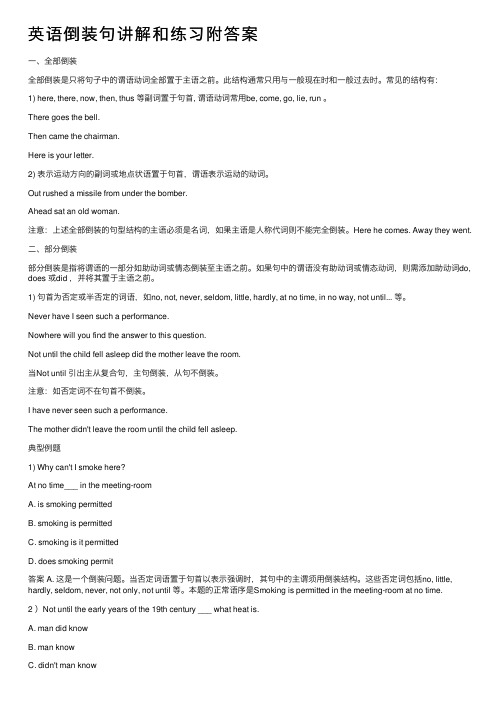
英语倒装句讲解和练习附答案⼀、全部倒装全部倒装是只将句⼦中的谓语动词全部置于主语之前。
此结构通常只⽤与⼀般现在时和⼀般过去时。
常见的结构有:1) here, there, now, then, thus 等副词置于句⾸, 谓语动词常⽤be, come, go, lie, run 。
There goes the bell.Then came the chairman.Here is your letter.2) 表⽰运动⽅向的副词或地点状语置于句⾸,谓语表⽰运动的动词。
Out rushed a missile from under the bomber.Ahead sat an old woman.注意:上述全部倒装的句型结构的主语必须是名词,如果主语是⼈称代词则不能完全倒装。
Here he comes. Away they went.⼆、部分倒装部分倒装是指将谓语的⼀部分如助动词或情态倒装⾄主语之前。
如果句中的谓语没有助动词或情态动词,则需添加助动词do, does 或did ,并将其置于主语之前。
1) 句⾸为否定或半否定的词语,如no, not, never, seldom, little, hardly, at no time, in no way, not until... 等。
Never have I seen such a performance.Nowhere will you find the answer to this question.Not until the child fell asleep did the mother leave the room.当Not until 引出主从复合句,主句倒装,从句不倒装。
注意:如否定词不在句⾸不倒装。
I have never seen such a performance.The mother didn't leave the room until the child fell asleep.典型例题1) Why can't I smoke here?At no time___ in the meeting-roomA. is smoking permittedB. smoking is permittedC. smoking is it permittedD. does smoking permit答案 A. 这是⼀个倒装问题。
高二倒装句练习30题带答案解析

高二倒装句练习30题带答案解析1.Near the lake stands a tall tree.Under the tree is lying a dog.On the branch sits a bird.Beside the lake lies a stone.答案解析:第一句是完全倒装,正常语序是A tall tree stands near the lake. 第二句正常语序是A dog is lying under the tree. 第三句正常语序是A bird sits on the branch. 第四句正常语序是 A stone lies beside the lake.2.In the forest grow many beautiful flowers.Among the flowers fly several butterflies.Under the tree plays a group of children.Beside the river runs a small stream.答案解析:第一句正常语序是Many beautiful flowers grow in the forest. 第二句正常语序是Several butterflies fly among the flowers. 第三句正常语序是A group of children play under the tree. 第四句正常语序是 A small stream runs beside the river.3.On the wall hangs a beautiful painting.Below the painting stands a table.Above the table floats a balloon.Beside the table lies a book.答案解析:第一句正常语序是 A beautiful painting hangs on thewall. 第二句正常语序是A table stands below the painting. 第三句正常语序是A balloon floats above the table. 第四句正常语序是A book lies beside the table.4.At the entrance of the park stands a big statue.Behind the statue is a fountain.In front of the statue plays a band.Beside the statue lies a bench.答案解析:第一句正常语序是 A big statue stands at the entrance of the park. 第二句正常语序是A fountain is behind the statue. 第三句正常语序是 A band plays in front of the statue. 第四句正常语序是 A bench lies beside the statue.5.In the sky shines the sun.Under the sun fly some birds.On the clouds sit some angels.Beside the clouds floats a rainbow.答案解析:第一句正常语序是The sun shines in the sky. 第二句正常语序是Some birds fly under the sun. 第三句正常语序是Some angels sit on the clouds. 第四句正常语序是A rainbow floats beside the clouds.6.On the stage performs a famous singer.Under the stage are many fans.In the audience sits a critic.Beside the stage stands a microphone.答案解析:第一句正常语序是 A famous singer performs on the stage. 第二句正常语序是Many fans are under the stage. 第三句正常语序是A critic sits in the audience. 第四句正常语序是A microphone stands beside the stage.7.In the garden bloom many colorful flowers.Among the flowers dance some bees.Under the tree rests a cat.Beside the flowerbed stands a gardener.答案解析:第一句正常语序是Many colorful flowers bloom in the garden. 第二句正常语序是Some bees dance among the flowers. 第三句正常语序是 A cat rests under the tree. 第四句正常语序是 A gardener stands beside the flowerbed.8.On the mountain stands a ancient temple.Below the temple flows a river.In the temple prays a monk.Beside the temple lies a stone path.答案解析:第一句正常语序是 A ancient temple stands on the mountain. 第二句正常语序是A river flows below the temple. 第三句正常语序是 A monk prays in the temple. 第四句正常语序是 A stone path lies beside the temple.9.At the seaside stands a lighthouse.Beside the lighthouse sails a ship.On the beach play some children.Under the sun shines the sea.答案解析:第一句正常语序是 A lighthouse stands at the seaside. 第二句正常语序是A ship sails beside the lighthouse. 第三句正常语序是Some children play on the beach. 第四句正常语序是The sea shines under the sun.10.In the library sit many students.Among the books studies a girl.Under the table lies a book.Beside the bookshelf stands a librarian.答案解析:第一句正常语序是Many students sit in the library. 第二句正常语序是A girl studies among the books. 第三句正常语序是A book lies under the table. 第四句正常语序是A librarian stands beside the bookshelf.11.Never in my life ____ such a beautiful place.A.have I seenB.I have seenC.did I seeD.I saw答案解析:A。
(完整版)高中英语语法倒装句讲解及练习(附答案)
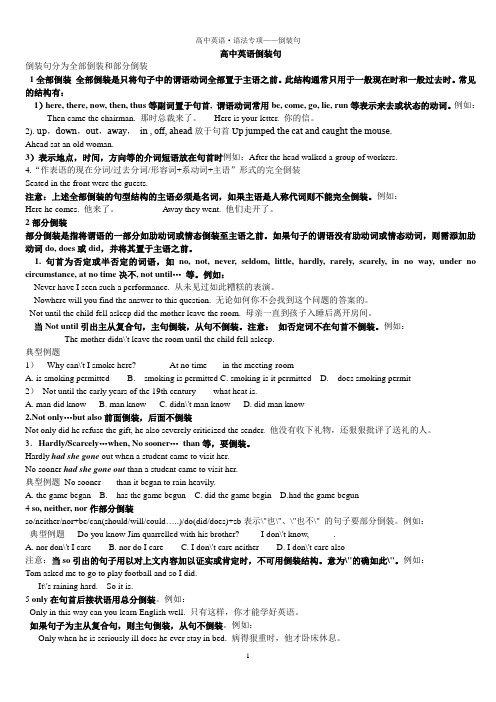
高中英语倒装句倒装句分为全部倒装和部分倒装1全部倒装全部倒装是只将句子中的谓语动词全部置于主语之前。
此结构通常只用于一般现在时和一般过去时。
常见的结构有:1)here, there, now, then, thus等副词置于句首, 谓语动词常用be, come, go, lie, run等表示来去或状态的动词。
例如:Then came the chairman. 那时总裁来了。
Here is your letter. 你的信。
2). up,down,out,away,in , off, ahead放于句首Up jumped the cat and caught the mouse.Ahead sat an old woman.3)表示地点,时间,方向等的介词短语放在句首时例如:After the head walked a group of workers.4.“作表语的现在分词/过去分词/形容词+系动词+主语”形式的完全倒装Seated in the front were the guests.注意:上述全部倒装的句型结构的主语必须是名词,如果主语是人称代词则不能完全倒装。
例如:Here he comes. 他来了。
Away they went. 他们走开了。
2部分倒装部分倒装是指将谓语的一部分如助动词或情态倒装至主语之前。
如果句子的谓语没有助动词或情态动词,则需添加助动词do, does或did,并将其置于主语之前。
1. 句首为否定或半否定的词语,如no, not, never, seldom, little, hardly, rarely, scarely, in no way, under no circumstance, at no time决不, not until…等。
例如:Never have I seen such a performance. 从未见过如此糟糕的表演。
Nowhere will you find the answer to this question. 无论如何你不会找到这个问题的答案的。
- 1、下载文档前请自行甄别文档内容的完整性,平台不提供额外的编辑、内容补充、找答案等附加服务。
- 2、"仅部分预览"的文档,不可在线预览部分如存在完整性等问题,可反馈申请退款(可完整预览的文档不适用该条件!)。
- 3、如文档侵犯您的权益,请联系客服反馈,我们会尽快为您处理(人工客服工作时间:9:00-18:30)。
倒装句讲解英语句子通常有两种语序:一种是陈述语序,一种是倒装语序。
将谓语的一部分或全部置于主语之前的语序叫做倒装语序。
倒装可分为二种:将整个谓语提到主语之前的叫完全倒装(full inversion);而只将be 、情态动词或者助动词放在主语之前的叫做部分倒装(partial inversion)。
形式倒装:只把强调的内容提至句首,主谓并不倒装形式倒装有四类:(1)感叹句:What + a/an + adj +n.+(主语+谓语)!How + adj /adv.+(主语+谓语)!(2)The+比较级+正常语序句子The+比较级+正常语序句子。
“越……,越…….。
”(3)Whatever+n.+主语+谓语主语+谓语,主句。
(4)A s/A l t h o u g h引导让步状语从句时,可以对表语、谓语、状语进行强调。
(注意:若对表语进行强调时,表语为单数可数名词,形容词最高级时,要省掉冠词)一、完全倒装1. There be结构。
另外在此结构中可以用来代替be动词的动词有:exist, seem, happen, appear,live, rise, stand等。
如: There stood a dog before him.There exist different opinions on this question.2 (1).在以here、there、n o w、then等副词开头的句子里。
“Here, There, Now, Then + come (或be,go,lie,run) + 主语"结构。
Here comes the old lady!Then came the hour we had been looking forward to.There comes the bus.Now comes your turn.如果主语是人称代词,就不用倒装。
如:Here you are.There she comes.(2).表示方向的副词out, in, up, down等置于句首,要用全部倒装。
如果主语是人称代词就不用倒装。
如:In came Mr. White.Up went the arrow into the air.Away went the boy.(3)当表示地点的介词词组(如on the wall, under the tree, in front of the house, in the middle of the room等)在句首时。
At the foot of the hill lies a beautiful lake.The soldiers ran to the building, on the top of which flew a flag.East of the lake lie two towns.Under the tree was lying a wounded soldier.3."分词(代词) + be + 主语"结构。
如:Walking at the head of the line was our teacher.Such was the story he told me.二、部分倒装部分倒装是把be动词、情态动词、助动词放到主语之前。
如果句子中没有这些词,要在主语之前加助动词do / does / did等,而把原来的谓语动词变成原形放在主语之后。
1.句首状语为否定词或半否定词的句子。
这类词或短语主要有never, neither, nor, little, seldom(很少,不常), rarely(很少,罕有), hardly, scarcely(几乎不,简直没有), no sooner(立即), not only, in no way(决不), at no time, few, not, no等,如:N ot a word did I say to him.Never have I found him so happy.Little does he care about what I said.I can't swim. Neither can he.No sooner had he gone to bed than he fell asleep.2. only +状语放在句首,要部分倒装。
如:Only by this means is it possible to explain it. (介词短语)Only then did I realize the importance of math. (副词)Only when the war was over in 1918 was he able to get happily back to w ork. (从句)3. so或s o引导的短语放在句首,要部分倒装。
如:I saw the film, so did she.So loudly did he speak that even people in the next room could hear him 4. "Not only + 分句,but also + 分句"句型中的前一分句要部分倒装。
如:Not only does John love Chinese, he is also good at speaking it.但not only...but also...连接主语时,不倒装。
如:Not only the mother but also the children are sick.5. Not until放在句首,从句不倒装,主句倒装。
如:Not until last week did they find the lost bike. (简单句)Not until my son had entered the university did he realize the importance of time. (复合句)6. often, well, many a time, now and again 等方式或频度副词(短语)开头的句子中,要用部分倒装结构。
如:Many a time has John given me good advice.Often have we made that test.7.用于某些表示祝愿的句子里May you succeed!Long live the People’s Republic of China!Not only…,b u t a l s o…引导的并列句。
not only位于句首时,所引导的前面的分句倒装,后面的分句不倒装。
故此称为”前倒后不倒”。
如:Not until+状语从句。
此两种结构位于句首时,倒装主句而不倒装从句,即:“主倒从不倒”。
如:1)Only when he told me did I know it.2)Not until I began to work did I realize how much time I had wasted.No sooner…than…,h a r d l y/Scarcely…w h e n…等句型也属此类用法。
如:No sooner(H a r d l y)had we reached home than(w h e n)it began to rain.代表N e i t h e r…nor…所引导的并列句。
2N若位于两分句之首,则前后分句均倒装。
即“前倒后也倒”。
如:Neither do I know her name,nor does he. No matter…引导的状语从句。
此时前面从句及后面主句均不倒装。
即“前后均不倒”。
如:No matter how busy he is,he always comes to help us.倒装句练习(I)1._______ and caught the mouse.A. Up the cat jumpedB. The cat up jumpedC. Up jumped the catD. Jumped up the cat2.______ and the lesson began.A. In came Mr BrownB. Mr Brown in cameC. In came heD. came in Mr Brown3.Over _______ , dead.A. rolling the goatB. rolled the goatC. did the goat rollD. the goat rolled4.—Where is my shirt, mum? —_________.A. There is itB. There it isC. There isD. Here is it5. —Where is your father?—Oh, ________.A. here he comesB. he here comesC. here does he comeD. here comes he6.The door opened and there ________ .A. enters an old manB. entered an old manC. did an old man enterD. an old man entered7. Now ______ your turn to recite the text.A. will comeB. comesC. has comeD. there is8.Often _____ them not to smoke here.A. we advisedB. advised meC. did we adviseD. had we advised9.________ playing soldiers.A. Inside the room were two boysB. Inside the room two boysC. Were two boys inside the roomD. Inside the room was two boys10. On the wall _______ two large portraits.A. are hangingB. hangedC. hangD. hangs11._______ who was wounded in the stomach.A. Among them were a soldierB. Among them was a soldierC. Among them a soldier wasD. Among they was a soldier12. Next door to ours ________ , who is no less than eighty.A. that lives an old manB. does an old man liveC. lives an old manD. where lives an old man13.She plays the piano very well, ______.A. so every one of us doesB. every one of us doesC. so does every one of usD. so do every one of us14.You say he works hard, ______, and _____.A. so he does; so you doB. so he does; so do youC. so does he; so do youD. so does he; so you do15. —I thought you women were present at the meeting. —__________.A. So we wereB. So we didC. So were weD. So did we16.I don’t think Jack will come today, _____.A. nor will MaryB. and Mary doesn’tC. Mary will eitherD. or Mary does17. She is fond of cooking, _____I .A. so amB. nor amC. neither doD. nor do18.Marx was born in Germany and German was his native language .A. So it was with EnglesB. So was it with EnglesC. So was EnglesD. So did Engles19.A fish needs water and without water it will die._______.A. So does a manB. So will a manC. So it is with a manD. So is it with a man20. So absorbed ___the work that she often forgot to ___ her meals.A. had she been in; doB. she was in; makeC. was she in; takeD. she had been in ; have21.So loudly ______ that every one of the class could hear him.A. did he speakB. did he spokeC. spoke heD. he spoke22. _________ his appearance that no one could recognize him.A. Strange so wasB. So strange wasC. Was so strangeD. So was strange23.Not once ______ their plan.A. did they changeB. they changedC. changed theyD. they did change24. Never ______ such a wonderful place as Hangzhou.A. are seeingB. had I seenC. I have seenD. have I seen25.Seldom ______ TV during the day.A. they watchB. are they watchingC. have they watchedD. do they watch26.Nowhere ______ as in my garden.A.the flowers were so beautifulB. were the flowers so beautifulC. so beautiful were the flowersD. so beautiful the flowers were27. Hardly ________ his homework when he went out.A. finished heB. he had finishedC. did he finishD. had he finished28.Scarcely finished their homework__I came into the classroom.A. had they; thanB. they had; whenC. had they; whenD. did they; when29. Not only _______ a promise, but also he kept it.A. has he madeB. does he makeC. he madeD. did he make30. Not until his comrades criticized him _____to admit his mistake.A. had he begunB. began heC. did he beginD. does he begin三.倒装练习(II)1. _____can you expect to get a pay rise.A.With hard workB. Although work hardC. Only with hard workD. Now that he works hard2. ____, mother will wait for him to have dinner together.A.However late is heB. However he is lateC.However is he lateD. However late he is3. Not until all the fish died in the river, _____ how serious the pollution was.A.did the villagers realizeB. the villagers realizedC. the villagers did realizeD. didn’t the villagers realize4. Not until I began to work ____ how much time I had wasted.A.didn’t realizeB. did I realizeC. I didn’t realizeD. I realized5.—Do you know Jim quarrel with his brother?—I don’t know, _______.A.n or don’t I careB. nor do I careC. I don’t care neitherD. I don’t care also6. Only by practicing a few hours every day _____ be able to waste much time.A.you canB. can youC. you willD. will you7. Not until the early years of the19th century _____ what heat is.A.man did knowB. man knewC. didn’t man knowD. did man know8. _____got into the room, _____ the telephone rang.A.He hardly; thenB. Hardly had he; whenC. He had not; thanD. Not had he; when9. ______ snacks and drinks,but they also brought cards for entertainment when they had a picnic in the forest.A. Not only they broughtB. Not only did they bringC. Not only brought theyD. Not only they did bring10.—I don’t think I can walk any further.—_____, Let’s stop here for a rest.A.Neither can IB. Neither do IC. I didn’t think soD. I think so11. Only in this way ______ do it well.A.must weB. we couldC. can weD. we can12. Hardly ____ when it began to rain.A.had he arrivedB. arrived heC. he had arrivedD. did he arrive13. Jack is a student and studies at the No. 2 Middle School. _____.A. It was the same with MikeB.So it is with MikeC. So is MikeD. So does Mike14. ______, I would have given you his address.A. If you asked meB. You had asked meC. Should you have asked meD.Had you asked me15. _____ that they had made an important discovery in science.A.Little they realizedB. They had realized littleC.Little did they realizeD. Little had they realized16. ______ that I couldn’t be absorbed in the wo rk.A. They made such talkedB. So loudly they talkedC. It was noise outsideD. Such a loud noise did they make17. Many a time _____ me good advice.A. he gaveB. does he giveC. he has givenD. has he given18. ____ have I seen a better performance.A. EverywhereB. Nowhere elseC. Everywhere elseD. Nowhere19. Not a single word ____ at the beginning.A. did he sayB. has he saidC. he saidD. he has said20. Only in an hour ago ____ out why he was absent.A. did the teacher foundB. the teacher foundC. did the teacher findD. had the teacher found21. _____the plane.A. Flew downB. Down flewC. Down was flyingD. Down fly22. Hardly _____ when the bus suddenly pulled away.A.they had got to the bus stopB. they got to the bus stopC. did they get to the bus stopD. had they got to the bus stop23. ______ I had time, I would have run round that lake again.A. IfB. UnlessC. HadD. When24. Not only ______ a promise ,but he also kept it.A. had he madeB. he had madeC. did he makeD. he makes25. ______ I would see you here.A.Little I dreamedB. Little do I dreamC. I dreamed littleD. Little did I dream26. There ____ .e theyB. they comeC. they are comeD. they will come27. ______ that he could not speak for a long time.A.So frightened was heB. So frightened he wasC. Was he so frightenedD. Frightened was he28. Only when class began ____that he had left his book at home.A.will he realizeB. he did realizeC. did he realizeD. should he realize29. Only when you have finished your homework _____ go home.A. can youB. would youC. you willD. you can30.Seldom___any mistakes during my past few years of working here.A. would I makeB. did I makeC. I did makeD. shall I make答案:倒装练习(I)1-5 CABBA 6-10 BBBDA 11-15 BCCBA 16-20 BAACC21-25 ABADD 26-30 BDCDC倒装练习(III) 1-5 CDABB 6-10 DDBBB11-15 CABDC 16-20 DDDAC21-25 BDCCD 26-30 BACAB。
